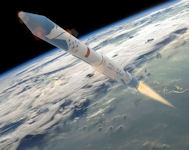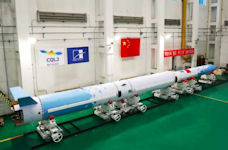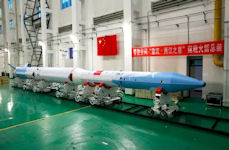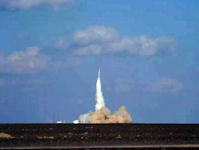OneSpace - OS-M
Beijing One Space Technology Group (OneSpace), a Chinese private rocket producer, is often referred to as China's SpaceX. In May 2018, OneSpace became the first Chinese private company to launch a commercial rocket. This small Beijing startup had started off with great fanfare, with two successive successes of its OS-X rocket probe in May and September 2018. However, the company's launches of its smaller OS-X series were suborbital missions.
According to OneSpace, the OS-M1 has a length of 19m and a diameter of 2m. Its reportedly capable of carrying a 205-kilogram payload to 300-kilometer low Earth orbit, and 73 kilograms to 800-kilometer sun-synchronous orbit.
Just like the LandSpace ZQ-1 launcher, it seems difficult to qualify OneSpace as the true 100% creator of the OS-M launcher. The main components of this rocket, ie solid propellant engines for example, are all provided a priori by CASC, builder of Long March rockets. For a start-up founded in 2015, this way of doing things allows OneSpace to free itself from the heavy and long-term investments in developing a new launcher from scratch. The strategy is purchasing key components off the shelf from a reliable historical player and then assembling them and making a successful first flight. This could create confidence in future prospects and attract others Financial investors subsequently, to be a wise choice for this kind of business. This was the same path chose by Orbital Sciences Corporation in the United States in the early 1990s.
A successful launch of OneSpace's OS-M rocket would be a significant step in the fast-growing commercial space sector in China, where scores of start-ups are catching up to their foreign counterparts, mostly those based in the US, in a potentially lucrative global market. OneSpace completed preparations for its first orbital launch scheduled later this month, the company announced on 12 March 2019. OneSpace said it had finished final assembly and system checks and will launch the OS-M launch vehicle at the Jiuquan Satellite Launch Center in Northwest China's Gansu Province at the end of March 2019.
"The launch of the 'Chongqing Liangjiang Star' will usher in a new era in China's commercial rocket sector," the company said in a press release sent to the Global Times. The rocket was named after the Liangjiang New Area in Southwest China's Chongqing Municipality, where the company has its headquarters. The firm's Beijing branch focuses on research and development.
The OS-M of OneSpace went into a spin shortly after the separation of its first stage. The ignition took place on March 27 at 17:39 Beijing time, but altitude control was lost less than a minute later, when the first stage separated from the rest towards T + 47s.
The OS-M is capable of delivering payloads into space orbit, according to the company. "Reliability and safety are the thresholds of the industry, and they are also notoriously difficult to achieve," Huang Zhicheng, a professor at the Beijing Institute of System Engineering, told the Global Times. "Several [private companies in China] have attempted to launch carrier rockets into orbits, but so far none have succeeded." Huang said that there is a good chance for OneSpace to pull off its attempt, given the company's successful suborbital launches. But "any experience in transporting payloads into orbits is meaningful, even if it fails," he said, adding that even companies like SpaceX failed several times before making successful launches.
The rise of Chinese private companies will support the development of the country's space technology, Huang said. Private companies "have lower costs and are more flexible in their exploration," Huang said. In October 2018, Land Space Technology Co (Landspace), tried but failed in its attempt to achieve the first orbital launch of the Zhuque-1 solid rocket. Another private company - Beijing Interstellar Glory Space Technology (iSpace) - is rushing to launch orbital missions. ISpace said last week that after series of tests, its Hyperbola-1 rocket is ready for launch. ISpace announced in January that it had secured 700 million yuan ($104.33 million) in funding since its establishment in 2017 and plans to carry out its first orbital launch in the first half of 2019.
|
NEWSLETTER
|
| Join the GlobalSecurity.org mailing list |
|
|
|





